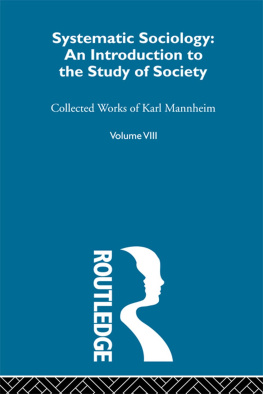CONSERVATISM: A CONTRIBUTION TO THE SOCIOLOGY OF KNOWLEDGE
The Sociology of Karl Mannheim
K. Mannheim (1935) Ideology and Utopia: an Introduction to the Sociology of Knowledge. London: Routledge & Kegan Paul (new edition 1991).
K. Mannheim (1940) Man and Society in an Age of Reconstruction. London: Kegan Paul, Trench, Trubner.
K. Mannheim (1943) Diagnosis of our Time: Wartime Essays of a Sociologist. Kegan Paul, Trench, Trubner.
K. Mannheim (1951) Freedom, Power and Democratic Planning. London: Routledge & Kegan Paul.
K. Mannheim (1952) Essays on the Sociology of Knowledge. London: Routledge & Kegan Paul.
K. Mannheim (1953) Essays on Sociology and Social Psychology. London: Routledge & Kegan Paul.
K. Mannheim (1956) Essays on the Sociology of Culture. London: Routledge & Kegan Paul (new edition 1992).
K. Mannheim (1957) Systematic Sociology. London: Routledge & Kegan Paul.
K. Mannheim and W. A. C. Stewart (1962) An Introduction to the Sociology of Education. London: Routledge & Kegan Paul.
K. Mannheim (1982) Structures of Thinking. London: Routledge & Kegan Paul.
K. Mannheim (1986) Conservatism: A Contribution to the Sociology of Knowledge. London: Routledge and Kegan Paul.
CONSERVATISM: A CONTRIBUTION TO THE SOCIOLOGY OF KNOWLEDGE
Collected Works Volume Eleven
Karl Mannheim
Edited and introduced by
David Kettler, Volker Meja and Nico Stehr
Translated by
David Kettler and Volker Meja
First published in 1936
by Routledge
Reprinted 1997 (twice), 1999
by Routledge
2 Park Square, Milton Park, Abingdon, Oxon, OX14 4RN
Transferred to Digital Printing 2005
Simultaneously published in the USA and Canada
by Routledge
270 Madison Ave, New York NY 10016
Routledge is an imprint of the Taylor & Francis Group
1986 Routledge
All rights reserved. No part of this book may be reprinted or reproduced or utilized in any form or by any electronic, mechanical, or other means, now known or hereafter invented, including photocopying and recording, or in any information storage or retrieval system, without permission in writing from the publishers.
Publishers Note
These reprints are taken from original copies of each book.
In many cases the condition of these originals is not perfect, the paper, often handmade, having suffered over time, and the copy from such factors as inconsistent printing pressure resulting in faint text, show-through from one side of a leaf to the other; the filling in of some characters, and the breakup of type. The publisher has gone to great lengths to ensure the quality of these reprints, but wishes to point out that certain characteristics of the original copies will, of necessity, be apparent in reprints thereof.
British Library Cataloguing in Publication Data
A catalogue record for this book is available from the British Library
Library of Congress Cataloguing in Publication Data
A catalogue record for this book has been requested
ISBN 0415136776
Acknowledgements
The present edition of Conservatism rests on a typescript of the text found among the papers, after his death in 1980, of Paul Kecskemeti, who played an important role in the posthumous publication of several works of Mannheim. We are grateful to Kurt H. Wolff (Brandeis University) and to Martin Rein (M.I.T.) for gaining us access to Kecskemetis papers. The unedited German typescript has been deposited, together with other papers left by Kecskemeti, at the Brandeis University Library in Waltham, Massachusetts. The original text has been published by the present editors in German, under the title Konservatismus: Ein Beitrag zur Soziologie des Wissens (Frankfurt: Suhrkamp, 1984).
The editorial and translation work on this book as well as the research on our introduction was financially supported by the Memorial University of Newfoundland, Trent University, the University of Alberta and the Social Sciences and Humanities Research Council of Canada. We have benefited from the help of Juan E. Corradi (New York), Joseph Gabel (Paris), va Gbor (Budapest), Ingrid Gilcher (Heidelberg), M. Rainer Lepsius (Heidelberg), A. P. Simonds (Boston), and Henk Woldring (Amsterdam). We are, as always, very grateful to Laura C. Hargrave for her efforts in readying the manuscript for publication.
David Kettler
Trent University
Volker Meja
Memorial University of Newfoundland
Nico Stehr
University of Alberta
David Kettler, Volker Meja and Nico Stehr
Introduction: The Design of Conservatism1
The historian of science, Thomas S. Kuhn, has argued that new developments in science are more decisively influenced by exemplary empirical studies than they are by exclusively theoretical reflections. If Karl Mannheims Ideology and Utopia2 and Structures of Thinking3 represent his important theoretical exercises, the essay on Conservative Thought4 has more commonly been taken as paradigmatic for a strictly empirical sociology of knowledge. Many social scientists and historians, who are not wholly satisfied with Mannheims attempts to work out the theoretical presuppositions and the implications of the discipline he helped to initiate, acknowledge Mannheims inquiry into conservatism as a decisive influence in the scientific enterprise of showing the social roots of complex intellectual structures.
The text which has had such influence represents little more than one-half of the work which led to Mannheims Habilitations-schrift in Heidelberg in 1925. Considerably more than half of the original was omitted when Das konservative Denken was published two years later in the Archiv fr Sozialwissenschaft und Sozialpolitik. But Mannheim showed that he continued to value more of it when he sought to incorporate additional parts of the manuscript while preparing the text for English publication late in his life. This project, like so many others, was interrupted by his premature death and completed by his executors. The full text, only recently discovered, clarifies the relationship between Mannheims study of conservatism and the rest of his achievement, because it helps to explain the considerations which led Mannheim to pursue the parallel lines of sociological explorations, as empirically sound as he could make them, and philosophical reflections, speculatively probing such claims as the one which represents sociology of knowledge as the organon for politics as a science.
The shortened published versions bring out one of the levels of the complex study, as Mannheim quite probably wanted them to do. As the essay has appeared in the past, in English as well as in German, it has quite reasonably been taken as an empirical study of the social factors underlying the formation and development of a certain pattern of political belief. And the model of inquiry abstracted from this example has since been considerably refined, both with regard to the ways in which the patterns to be explained are delineated and with regard to the specification and substantiation of the sociological imputations involved. But as the work was written, it also manifests Mannheims preoccupation with the nature of political knowledge, not belief alone, and his continuing hope that modes of scientific inquiry can serve as the way to such knowledge without sacrificing scientific devotion to evidence or disinterestedness. What is at issue in the new reading made possible by the discovery of the complete text is not a falsification of accepted interpretations, but the recognition of an additional dimension, more problematical and philosophically ambitious, and indicative of the uneasiness with which Mannheim subjected himself to that scientific asceticism which Weber promulgated.





